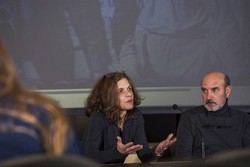Johanna Foster, Ph.D., delivered a lecture entitled “What did the Islamic State in Iraq and Syria (ISIS) do to you?” where she presented her research on the ways journalists violated international standards for ethical reporting on sexual violence in Wilson Hall on Monday, Feb. 25.
Foster, the Helen McMurray Bennett Endowed Chair of Social Ethics and an associate professor of sociology, conducted a study on media ethics and how reporters neglected to follow guidelines when reporting on Yazidi women who were survivors of sexual abuse.
On Aug. 3, 2014, ISIS attacked the Yazidi people in Kurdistan (northern Iraq). The genocidal campaign was meant to destroy the religious minority group through killings, rape, and forced religious conversions.
Over 6,000 women and children were abducted, some sold as jihadi brides, with half still in captivity today. The entire community has been displaced.
Foster’s team entered the picture when “sensational” headlines began surfacing about instances of sexual violence against Yazidi women.
“As a team of feminist scholars and advocates, we became concerned that journalists were violating basic principles of ethical reporting of sexual violence,” she said.
Her team found that reporters were seeking out graphic accounts of mass rape and sex trafficking, above all else. The headlines spun a “popular narrative,” that created “binary frames of non-Western women, particularly ethnic and religious minority women in the Global South and East, solely as helpless victims of patriarchal regimes, and ‘civilized’ white men and women in the U.S. and Europe as ‘liberators,’” Foster said.
Mariana Vujnovic, an associate professor of communication, said that in some ways the reporting Foster described was yellow journalism. “In global news reporting ‘if it bleeds it leads’ has been an unfortunate standard.”
She explained that journalists frequently lack knowledge of truths in the world and are ill-equipped to deal with them.
John Morano, a professor of journalism, agrees that covering sexual violence against women, in what is still a war zone, is different than covering local politics.
Reporters should consider how the Yazidi women want to be portrayed, provided facts can be verified. He explained that reporters and editors “reserve the right to decide how a story is presented,” with respect to “ethics and industry norms.”
Foster explained that the Yazidi women were upset that journalists were taking their stories and that they were not receiving aid in return. Foster said that the “helpless” narrative being spun is oversimplified.
“While it is true that Yazidi women are, indeed, calling for an international response, and for the rescue of women and girls from ISIS captivity, that does not mean that they are simply helpless victims waiting for American or European forces, or journalists, to come to their rescue,” she commented.
“By looking at the press treatment of Yazidi women who were abducted by ISIS, Dr. Foster’s research is fueling a very important discussion, one that examines the ways journalists might be victimizing victims,” Morano said.
Vujnovic speculates that journalists likely believed the questions they posed “would illuminate global audiences to what happened.”
In her experience interviewing refugees from Bosnia in the 1990s, including women who were had been raped, she was in a similar position. “[The women] all wanted us to help and I felt I had little resources and power to do so,” she said.
Foster acknowledged the possibility that the Yazidi women did not completely understand the role of the reporters and their inability to provide aid.
However, she considers it the journalists’ responsibility to make their role clear. Having interpreters present would aid in these instances.
“In an effort to maintain objectivity, journalists keep sources at arm’s length. That, however is not always the case. There are times when one might need to stop being a journalist and instead be a human being,” Morano said.
Furthermore, Foster believes that the media coverage of sexual violence to be exploitive of the Yazidi women. “[Readers] are not actually interested in the full story, or really all that concerned about gender oppression,” she explained. “Unfortunately, we live in a culture saturated by a continuum of pornographic narratives of women and girls, and many of these stories are simply versions of this and intended to entertain readers with stories of women’s degradation.”
Given the “hyper-focus on stories of sexual trauma,” Morano questions what stories are being left out.
Foster clarified that she is not saying journalists should remain silent and refrain from reporting on Yazidi attacks or global gender violence. Rather, the stories need to be told in a way that “adhere to basic ethical principles.”
PHOTO COURTESY of Monmouth University



